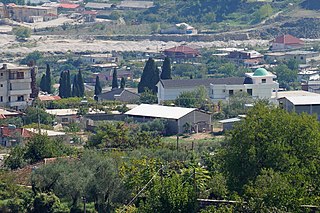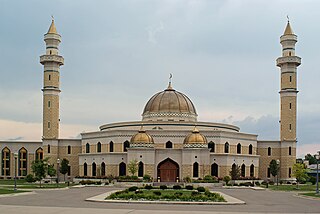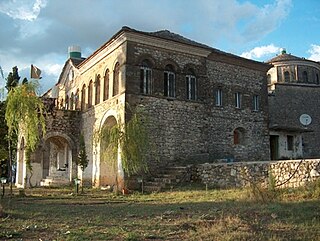
The Bektashi Order or Bektashism is an Islamic Sufi mystic order originating in the 13th-century Ottoman Empire. It is named after the saint Haji Bektash Veli. The Bektashian community is currently led by Baba Mondi, their eighth Bektashi Dedebaba and headquartered in Tirana, Albania. Collectively, adherents of Bektashism are called Bektashians or simply Bektashis.

Haji Bektash Veli was an Islamic scholar, mystic, saint, sayyid, and philosopher from Khorasan who lived and taught in Anatolia. His original name was Sayyid Muhammad ibn Sayyid Ibrāhim Ātā. He is also referred to as the "Sultan of Hearts" and the "Dervish of the Dervishes".

Rexheb Beqiri, better known by the religious name Baba Rexheb, was an Albanian Islamic scholar and Sufi. He was the founder and the head of the Bektashi Sufi lodge (tekke) located in Taylor, Michigan, United States.

The Arabati Baba Tekḱe is an Ottoman takya located in Tetovo, North Macedonia. The tekke was originally built in 1538 around the türbe of Sersem Ali Baba, an Ottoman dervish. In 1799, a waqf provided by Recep Paşa established the current grounds of the tekke.

The Zall Tekke or Asim Baba Tekke is a Bektashi teqe in Gjirokastër, Albania. It is a Cultural Monument of Albania.

The Tekke of Frashër or Nasibî Tâhir Baba Tekke is a Bektashi shrine and Albanian Bektashi tekke founded in 1781 and registered Cultural Monument of Albania, located in Frashër, Gjirokastër County in southern Albania. The tekke was crucial to the Albanian National Awakening, particularly in the nationalist movements of the late 19th century, and it was one of the wealthiest and revered tekkes in Albania.
Reshat Bardhi was an Albanian religious leader who served as the 7th kryegjysh or Dedebaba of the Bektashi Order from 1991 to 2011.
The organization Global Detroit stated that the largest group of ethnic Albanians not in Europe is in Metro Detroit. As of 2014, 4,800 ethnic Albanians live in Macomb County, making up the fourth-largest ethnic group in that county, and the highest concentration of Albanians in Metro Detroit. There are also several thousand in Wayne County, with most living outside Detroit city limits; Hamtramck and St. Clair Shores are plentiful in Albanian American and Kosovar-Albanian American communities. There are at least ethnically 30,200 Albanian people in Michigan, consistuting 0.3% of Michigan's population.

Islam is practiced by several Muslim American groups in Metro Detroit.

Nasibi Tahir Babai, born Tahir Skënderasi, was an Albanian Bektashi wali and bejtexhi.

Baba Shemimi, also known as Kemaledin Shemimi Ibrahim, Baba Shemim, Baba Shemimi of Fushë-Krujë or Baba Shemimi of Krujë, was an Albanian Bektashi bejtexhi and martyr.

The Tekke of Melan is a khanqah and a famous pilgrimage site of the Bektashi Order of Sufism. It was built in 1800 in Libohovë, near Gjirokastër in southern Albania. The site lies on a hill overlooking the Dropull plain south of Gjirokastër, on the east side of the valley near the small village of Vlaho Goranxi.

Ahmet Myftar (1916–1980) was the 6th Dedebaba of the Bektashi Order in Islamic Sufi mysticism. He was the final dedebaba to have served during the People's Socialist Republic of Albania.
The World Bektashi Congress, formerly called the National Congress of the Bektashi before the 1990s, is a conference during which leading members of the Bektashi Order make important decisions. It has been held in Albania since 1921.
Baba Ali Tomorri was an Albanian Bektashi religious leader.
The Bektashi Order is an Islamic Sufi order that spread to Albania through Albanian Janissaries during the period of Ottoman control in Albania. The Bektashi make up 2.5% of the country's population. In regards to ethics, the Bektashi adhere to the line "Be master of your hands, your tongue, and your loins" which essentially means do not steal, do not lie or speak idly, and do not commit adultery.
The Teqe of Bulqiza or Tekke of Bulqiza is a Bektashi tekke in the town of Bulqiza. It was founded in the nineteenth century by Baba Fejzë Bulqiza, an important Albanian Bektashi figure in the local Dibra region who opened schools in the surrounding area after returning to Albania in 1827 upon the completion of his religious training in Anatolia. The tekke was first destroyed in 1860, and Baba Fejzë Bulqiza is said to have been killed at this point in time as well, but he has no known grave. A new tekke was raised in his honour around 1900, and thereafter closed in 1967 during the Communist period due to the Albanian communist party's crackdown on religion. After the fall of the communist regime, the Teqe of Bulqiza was reopened as a tyrbe in 1994.

The Teqe of Baba Ali, or Teqe of Baba Abdullah, is a Bektashi tekke in the village of Alipostivan, Qendër Piskovë, Përmet municipality, Albania. It sits upon a hill overlooking the Vjosa valley and the Nemërçka mountain, and the name of Alipostivan itself is said to derive from Ali, post i vendit. The tekke of Baba Ali is known for the preservation and development of Bektashi traditions, particularly in spreading Bektashism to the Deshnica area and along the border villages of Skrapar. Historically, it has cooperated closely with the tekke in Frashër.
The Teqe of Baba Isuf or Teqe of Bllaca is a Bektashi tekke in the village of Bllacë, Dibër. It was founded in the late nineteenth century by Baba Isuf. The tekke has historically been an important centre of learning, known for its patriotic contributions in educating people in the Albanian language during late 19th and early 20th centuries. The tekke's feast day is the 10th of June.












